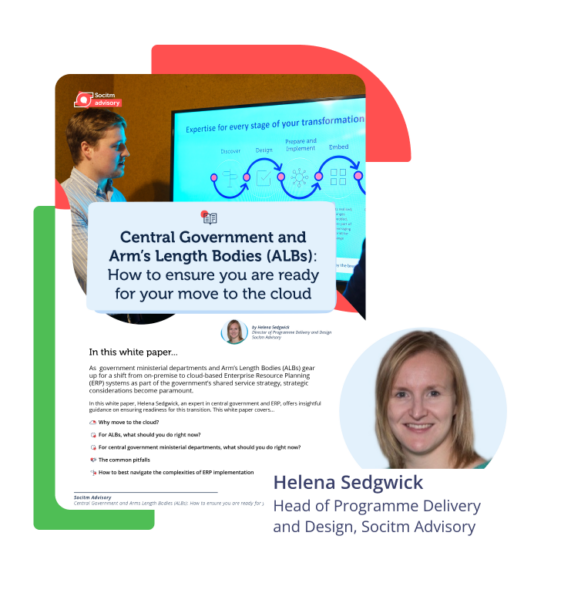Executive summary
As government ministerial departments and Arm’s Length Bodies (ALBs) gear up for a shift from on-premise to cloud-based ERP systems as part of the government’s shared service strategy, strategic considerations become paramount. In this whitepaper, Helena Sedgwick, an expert in central government and ERP, offers insightful guidance on ensuring readiness for this transition.
The white paper covers….
Why move to the cloud?
Cloud-based ERP systems promise a plethora of benefits, including enhanced access to information, cost-savings, standardisation of processes, and improved data security. Moreover, the inevitability of moving to the cloud, with on-premise solutions facing eventual obsolescence, underscores the urgency for preparation.
For ALBs, what should you do right now?
Understanding the government’s shared service strategy and aligning your ERP journey with long-term objectives is crucial. We know central government ministerial departments will move first, with the assumption that ALBs will follow, but the timeline on when this might be is currently unclear. Therefore, considering the wait for government directives, ALBs should proactively explore interim options, such as commissioning options appraisals, to inform decision-making and ensure a smooth transition to a future cluster solution.
For central government ministerial departments, what should you do right now?
Similarly, ministerial departments already aligned with designated clusters should consider the benefits a strategic partner could bring to advocating their organisational needs, and supporting the upcoming significant changes in processes and technology, effective change management and communication strategies, that will be imperative for successful transformation.
The common pitfalls
The common pitfalls are outlined, such as underestimating the magnitude of ERP programmes, resisting the adoption of standard best practices and under-preparing, particularly in data migration.
How to best navigate the complexities of ERP implementation
…and how to ensure your organisation is well-positioned for a seamless transition. You’ll understand the support available through your ERP journey, from outline business cases through procurement advice and facilitating programme preparation.
Read the informative and insightful white paper below.
Central government and Arm’s Length Bodies (ALBs): How to ensure you are ready for your move to the cloud
As an Arm’s Length Body (ALB) or central government ministerial department currently using an on-premise ERP system, you are destined for a move to a cloud-based ERP product. As a ministerial department, you are likely to be aligned to your cluster already, but is your voice being heard? And for ALBs, your implementation could be over five years away, can you wait until then before moving?
In this blog, our central government and ERP expert Helena Sedgwick shares her advice to ministerial departments and ALBs to ensure readiness to realise the benefits of a move to a cloud-based ERP system.
Why move to a cloud-based ERP system?
There are a myriad of positives to moving to the cloud, that will give you more access to information and should help deliver cost-savings;
- You are able to standardise and use best practice processes, which should enable you to save money in the long term
- You will enable more self-service, to empower people to take control of their processes and data
- You will have access to more real-time data and information, removing reliance on other teams to provide it
- You can ensure your data is secure in the cloud
- You will benefit from regular software updates; new functionality, new features to enable you to improve your product and ensure the best ways of working.
Plus, ultimately you will have no other option than to move to the cloud, as all of the on-premise solutions will go out of support at some point in the future!
As an ALB, from an ERP perspective, what should I be thinking about now?
It’s likely you now have a better idea of the timelines associated with the government shared strategy. Now you should think about your ERP journey, what it is you want and how that aligns with the shared services strategy for the longer term.
The government have shared their plans to move ministerial departments onto a cloud-based system first, which is likely to take at least four years. This means it could be five years before the government articulates how your organisation fits into the strategy and when you will be required to move.
You may not be able to wait until then, to achieve what you want to. And your on-premise products may go out of support sooner, so consider your plans now in plenty of time. Right now, you might want to consider what options you have for the interim, for example, by commissioning an options appraisal. It’s important to consider the timing for this, given our experience, it’s likely to take you a year to get just from thinking about an ERP programme to actually being able to start one.
An options appraisal will help you start to make decisions around what it is that you need and understand how that aligns with the shared service strategy, so you are on the front foot for a move to the cloud. You’ll have a vision in mind so that when you are ready to move on to the shared services strategy, and what is being implemented, then the move will be smoother because you are already half way along the journey.
How can a strategic partner support an ALB?
A strategic partner will be experienced at helping organisations through their ERP journey. For example, our consultants at Socitm Advisory often start with supporting the rudimentary foundations of a decision around a single ERP system or Best of Breed. We work with organisations to understand what their strategic objectives are, what the pain points of their current systems are, and recommend how they can overcome those pain points.
As we have worked with many government organisations on this, we have financial models that support the development of an outline business case, and then take you forward in terms of procurement advice and beginning programme preparation, such as establishing your change team, reviewing your data, and all the other preparations that you can do before you start working with partners such as your systems integrator and your software vendor, which means you can hit the ground running when your ERP programme actually begins.
As a central government ministerial department, what should I be thinking about?
You will be on a cloud-based system within the next few years, possibly four or more, that’s the government advice. So you should align with your designated cluster, it’s likely you’re in a programme already.
Right now, you might want to consider seeking independent strategic advice to ensure your voice is being heard as part of that programme, to make sure the benefits you need from the systems are being considered, and that the change is collaborative rather than being done to you.
By engaging with a strategic partner, such as Socitm Advisory, you will have experts who understand the government landscape as well as being able to advocate what the design should look like based on experience from many previous ERP implementations.
Data is a key element within ERP programmes. You will want to consider getting your data strategy and quality of data in a place that enables the move to the new system. You may not have dusted off the data strategy and quality documents since your last implementation – now is the time to get this key element moving in the right direction.
In addition to data, it is important to start considering what your overall requirements are and how the new system will meet those needs. Requirements you need to consider include processes, people readiness, and your support model – gathering your thoughts in these areas will support a smoother transition when your transformation programme begins to speed up.
“You will be part of a shared service, but you need to determine what you need on your side now.”
Helena Sedgwick, Head of Programme Delivery and Design
It is a huge programme of change moving from an on-premise solution to a cloud-based solution, every staff member will be affected by a change in process or technology. So ensuring you have change management plans and communications in place from the outset, that will enable successful business change is critical.
How can a strategic partner support a central government ministerial department?
s a ministerial department who is part of a cluster, a strategic partner will help you prepare for your move. For example, our consultants at Socitm Advisory will work with you to help you get what you need in place and be the voice for your organisation in various areas, especially with regards to the thinking around how the system architecture will look.
We’re currently working with a lead central government department to support their move to the cloud. As an example, this organisation is being asked for a lot of information about what it has in place, and what they might need to have in place in the future. They are required to be part of various working groups to ensure they are all aligned on the system architecture, so we provide extra capacity and capability to the department to help them to be an effective part of that cluster, to support the delivery of all the work that needs to be done to get the cluster towards moving to a cloud-based product and also that that organisation has their voice heard as part of that group.
What are the pitfalls to avoid?
Don’t underestimate an ERP programme
Often, there is a massive underestimation of what a programme like this entails. If you are thinking about this as a systems upgrade, then your ERP journey is likely to be difficult!
It’s a huge transformation. It will change processes for every person within your organisation, and in order to get the benefits from your investment, it needs to be treated as a transformation.
One area that we have found to be challenging for organisations is the move to a self-serve model for some areas of functionality in ERP. You are likely to need to change behaviours of people who have perhaps never done these activities in the past, and help those who may have done it differently adapt to the new asks you will make of them.
Therefore, having the right mindset from the outset, understanding the challenge ahead and the financial and human resources required to realise the benefits is crucial.
‘Adopt don’t adapt’
Adopting the new system, to the best practice processes that the product will give you rather than adapting it, and trying to customise is critical. If you customise, that is where you will see a big downfall because you won’t get the benefits from standardised best practice processes and it will be trickier to implement the often mandatory upgrades; they will have to be reviewed and tested at each upgrade, which will undoubtedly add additional cost and complexity to the approach.
Preparation, preparation, preparation…
Invest time to prepare before you start procuring and moving information to a new platform. Data and data migration are the biggest area here. And that is because sometimes the products have been in place for over 20 years so there is a huge amount of data.
There are several areas to consider before you start your implementation when it comes to data. What is it you need? How are you going to map that data to the new solution? What would be the minimum you need to continue to operate in a safe and sound way? Data is an area that is often more difficult to quantify and plan than organisations anticipate, so doing as much of this as upfront thinking as possible is a sensible investment of time.

Helena Sedgwick is Socitm Advisory’s Head of Programme Delivery and Design. Helena has nearly 20 years’ experience consulting in the UK Public Sector. She combines Programme Management and transformational change experience to help solve clients complex problems.

Get in touch or book a meeting with our Account Director, Rick White, to discuss your ERP transformation journey with us.
